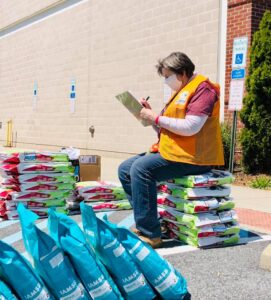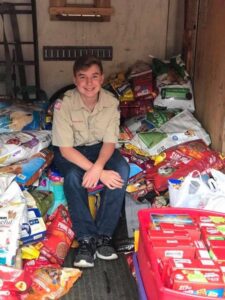Brandea Taylor, Animal Care Coordinator for Humane Pennsylvania
It was August 11th, 2016. I was scheduled as an Adoption Technician and was called up for an incoming dog. I walked into the front lobby and there she was — cold, wet, and shaking. The man who found her was holding her tightly in his arms. His wife walked me through how they stumbled across her that afternoon while they were walking out to their truck. They found her curled up underneath it in the parking lot. Unsure of what to do next, they decided to bring her to us. I thanked them for helping her as we slowly exchanged her from his arms to mine.
I carried her back to her new bedroom in our kennel, where she was greeted by several barking dogs.  The louder it got the more she started to shake. I placed her on a big fluffy comforter, opened her cage door, and placed her information card in the slip on the front of her cage door. She sat up, looked in the direction of the door, and ran outside. I made it a point to walk past her kennel several times that day to see if she was acclimating okay. Each time I saw her curled up in the outside part of her run, I walked around and placed a blanket on that side to make sure she remained comfortable. “You don’t want to lay on the hard cement, Anastasia.” She stood up and walked as far away from me as she could.
The louder it got the more she started to shake. I placed her on a big fluffy comforter, opened her cage door, and placed her information card in the slip on the front of her cage door. She sat up, looked in the direction of the door, and ran outside. I made it a point to walk past her kennel several times that day to see if she was acclimating okay. Each time I saw her curled up in the outside part of her run, I walked around and placed a blanket on that side to make sure she remained comfortable. “You don’t want to lay on the hard cement, Anastasia.” She stood up and walked as far away from me as she could.
Another week went by and we didn’t hear back from any rescues that we reached out to. All the while, I was working on gaining Anastasia’s trust. By the end of the second week, I was able to get Anastasia out of her kennel on her own without forcing her. This is when I realized she wouldn’t walk on a leash or cement but would run around as soon as she felt grass. I worked on her leash walking, with the assistance of hot dogs, and carried her from one grassy area to another. She came to me whenever she heard my voice and started following me everywhere. Shortly after, the Director of Shelter Operations asked me if I’d be interested in doing an adoption write-up on Anastasia. She told me that it was decided that they were going to place Anastasia up for a special adoption. My heart sunk. Of course I wanted to help but the thought of not being around Anastasia was one I didn’t want to get used to.
At the time, I was still living with my family so I couldn’t just take her home. I talked them into being okay with Anastasia staying with us temporarily as a foster. This way I could see if she would fit in with the other family pets before I got my hopes up. Our Doberman, Ava Mae, wasn’t a fan of her at first. After all, she was the “baby” of the family and didn’t like to share much. Anastasia was oblivious to pretty much everything. As long as she was sitting next to me, on my lap, or playing in the yard, life was great! It reached a point where I decided we had to see if the relationship between the two dogs was going to work out or not. One morning before work, I removed both of their leashes in the backyard and hoped for the best. Within seconds, they started playing. I burst into tears — happy ones of course — as I saw Ava Mae appearing to guide Anastasia around the backyard. I looked at my mom and said “That’s it, she is staying.”
On September 12th, 2016, I signed the paperwork and made it official.
Anastasia had her 5th birthday this past March. She loves spending time with her new little human and enjoys scrambled eggs and deer bologna regularly (she upgraded from her love of hotdogs). Every now and then she will still run into furniture, trees, or humans when she’s overcome with excitement. Anastasia has come so far over the past four years and has taught me so much about life, unconditional love, and patience. She was brought into this shelter for me to meet her. Little did I know that I needed her just as much as she needed me.
Adopting a shelter pet is a life-changing experience. By adopting, you may not have the chance to go and handpick the perfect puppy from a litter. The animals may even come with “baggage” – but who doesn’t? The animals that come into our shelter, and any other shelter for that matter, are positively unforgettable and deserving of forever homes.
So, do it! Go out to your closest animal shelter and say “hello” to all of those happy tails and biscuit-making paws. Not sure of what you’re looking for? That’s okay! The shelter staff is happy to help walk you through the animals that are available. You might be surprised who you end up creating an unbelievable bond with and, I promise, you won’t regret it.


 think of the vital role animal care volunteers play as fairly simple, but as a community-supported charitable organization, volunteers serve in so many other ways. Our volunteer board of directors helps guide the mission and vision of Humane Pennsylvania and ensures stewardship of our donor resources. Event and fundraising volunteers help connect Humane Pennsylvania with people in the community who want to support our work. Professional service providers — ranging from attorneys to mechanics to builders — help us stretch our dollars so we can put the most into care for the animals. There is no part of our work that is not touched and improved through volunteer efforts and I am truly grateful to work with all of these dedicated animal lovers!”
think of the vital role animal care volunteers play as fairly simple, but as a community-supported charitable organization, volunteers serve in so many other ways. Our volunteer board of directors helps guide the mission and vision of Humane Pennsylvania and ensures stewardship of our donor resources. Event and fundraising volunteers help connect Humane Pennsylvania with people in the community who want to support our work. Professional service providers — ranging from attorneys to mechanics to builders — help us stretch our dollars so we can put the most into care for the animals. There is no part of our work that is not touched and improved through volunteer efforts and I am truly grateful to work with all of these dedicated animal lovers!” “
“ caregivers as part of the Healthy Pets Initiative (HPI). A vital function of the facility is a tactile presence to verified clients who stop by Spike’s Pet Pantry as they pick up supplemental pet food and supplies, learn about our services, and come to trust us as their “pet partner”. Volunteers keep our program running efficiently by performing regular, timely data entry, sort/prepare pet food/supplies on pantry days and pick up pet food/supply donations throughout the community. We also rely on them to help us unload and distribute tractor-trailers full of donations from the Greater Good Affiliate Program and other high volume donors so we can share resources with other animal welfare organizations, including state/county animal response teams. Volunteers graciously extend their existing relationships with valuable, pet-friendly individuals and businesses to encourage, create and maintain local engagement and support of HPI events (community vaccination/microchip clinics, etc.) and programming. When existing, more fortunate pet owners truly understand our mission to improve local pet care and ownership habits, they become an integral part of achieving our goal to be the best community for pets and their owners. For these reasons, we are beyond grateful for the volunteers that continue to help make Humane Pennsylvania an amazing organization for animals and animal caretakers.”
caregivers as part of the Healthy Pets Initiative (HPI). A vital function of the facility is a tactile presence to verified clients who stop by Spike’s Pet Pantry as they pick up supplemental pet food and supplies, learn about our services, and come to trust us as their “pet partner”. Volunteers keep our program running efficiently by performing regular, timely data entry, sort/prepare pet food/supplies on pantry days and pick up pet food/supply donations throughout the community. We also rely on them to help us unload and distribute tractor-trailers full of donations from the Greater Good Affiliate Program and other high volume donors so we can share resources with other animal welfare organizations, including state/county animal response teams. Volunteers graciously extend their existing relationships with valuable, pet-friendly individuals and businesses to encourage, create and maintain local engagement and support of HPI events (community vaccination/microchip clinics, etc.) and programming. When existing, more fortunate pet owners truly understand our mission to improve local pet care and ownership habits, they become an integral part of achieving our goal to be the best community for pets and their owners. For these reasons, we are beyond grateful for the volunteers that continue to help make Humane Pennsylvania an amazing organization for animals and animal caretakers.”  Pennsylvania is a hot spot for tick borne disease. Some species of ticks in our area frequently transmit Lyme, Anaplasma, and Ehrlichia. Infrequently seen tick borne diseases in our area include Babesiosis and Rocky Mountain Spotted Fever. The same ticks that transmit tick borne disease to dogs can transmit the disease to humans as well. A tick needs to be feeding for over 18 hours before it transmits disease. It is important to use a reputable product that acts quickly to kill a tick before it can spread disease. Some products will repel ticks as well. Checking animals for ticks after they come in from outside is advisable. There are many great products on the market with a variety of routes of administration. These routes include a chewable that last one to three months, collars that last up to 8 months and once monthly topical applications. Choosing the right one will depend on your pet and your preference. Products made to be effective against ticks are also effective against fleas. It is extremely important to make sure a product that is effective against ticks is specifically labeled for use in cats.
Pennsylvania is a hot spot for tick borne disease. Some species of ticks in our area frequently transmit Lyme, Anaplasma, and Ehrlichia. Infrequently seen tick borne diseases in our area include Babesiosis and Rocky Mountain Spotted Fever. The same ticks that transmit tick borne disease to dogs can transmit the disease to humans as well. A tick needs to be feeding for over 18 hours before it transmits disease. It is important to use a reputable product that acts quickly to kill a tick before it can spread disease. Some products will repel ticks as well. Checking animals for ticks after they come in from outside is advisable. There are many great products on the market with a variety of routes of administration. These routes include a chewable that last one to three months, collars that last up to 8 months and once monthly topical applications. Choosing the right one will depend on your pet and your preference. Products made to be effective against ticks are also effective against fleas. It is extremely important to make sure a product that is effective against ticks is specifically labeled for use in cats. AND outside of our pets’ bodies. Fleas are a common cause of skin disease, allergies and intestinal parasites for dogs and cats. They are contagious external parasites that can readily jump from animal to animal or can be carried by people into a home as they jump on our clothing. Wild animals coming into back yards where our pets roam is another way a yard can be a source of fleas. Once a flea is observed it is not sufficient to bathe once and call your problem resolved. A flea treatment needs to be used for a minimum of 3 months to get rid of an infestation. This length of time is due to the life cycle of the flea. Fleas can live in an environment without a blood meal for over 3 months. Flea dips and shampoos are not recommended due to their harsh ingredients. Flea dips do not help rid the animal of an infestation because pupae and eggs are already in the environment. Bathing with a gentle shampoo made for pets is a better option for removing adult fleas. A quality chewable or topical application for a minimum of 3 months is important treatment and prevention against future fleas. Because fleas are so contagious, all pets in a household need to be treated concurrently. Fleas carry diseases such as tapeworms, and Bartonella most commonly. Not all products that are effective against fleas are effective against ticks. Cats can have particular sensitivity to certain ingredients in low quality flea products, which should be avoided.
AND outside of our pets’ bodies. Fleas are a common cause of skin disease, allergies and intestinal parasites for dogs and cats. They are contagious external parasites that can readily jump from animal to animal or can be carried by people into a home as they jump on our clothing. Wild animals coming into back yards where our pets roam is another way a yard can be a source of fleas. Once a flea is observed it is not sufficient to bathe once and call your problem resolved. A flea treatment needs to be used for a minimum of 3 months to get rid of an infestation. This length of time is due to the life cycle of the flea. Fleas can live in an environment without a blood meal for over 3 months. Flea dips and shampoos are not recommended due to their harsh ingredients. Flea dips do not help rid the animal of an infestation because pupae and eggs are already in the environment. Bathing with a gentle shampoo made for pets is a better option for removing adult fleas. A quality chewable or topical application for a minimum of 3 months is important treatment and prevention against future fleas. Because fleas are so contagious, all pets in a household need to be treated concurrently. Fleas carry diseases such as tapeworms, and Bartonella most commonly. Not all products that are effective against fleas are effective against ticks. Cats can have particular sensitivity to certain ingredients in low quality flea products, which should be avoided.